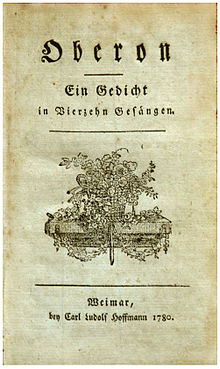- Oberon (poem)
-
Oberon is an epic poem by the German writer Christoph Martin Wieland. It was based on the epic romance Huon de Bordeaux, a French medieval tale.[1] It first appeared in 1780 and went through seven rewrites before its final form was published in 1796. It had a major influence on many musical and poetic works of the time, such as Schiller's Don Carlos, Goethe's Faust: The Second Part of the Tragedy and Mozart's The Magic Flute, as well as on the Portuguese poet Francisco Manoel de Nascimento. The artist Gustav Paul Closs also provided illustrations for it.
Carl Maria von Weber used it as the basis for his last opera, Oberon, in 1826. An adaptation by Sophie Seyler was re-adapted by Karl Ludwig Giesecke to provide a libretto for Paul Wranitzky. Its English translators include Matthew Lewis, William Sotheby, John Quincy Adams' translation of Oberon (as edited by A. B. Faust, New York, 1940)[2]
References
- ^ Brown C. Oberon. In: The New Grove Dictionary of Opera. Macmillan, London and New York, 1997.
- ^ Listed on a microfilm at the Massachusetts Historical Society
External links
- (German) Oberon on Project Gutenberg
Categories:- 1796 poems
- German poems
Wikimedia Foundation. 2010.

